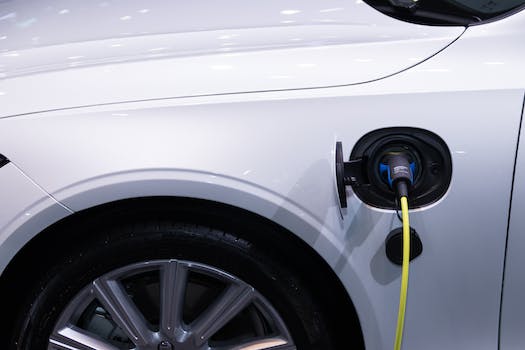
Understanding Hybrid Cars: Benefits and Technology Explained
-
Table of Contents
- Introduction
- How Hybrid Cars Reduce Carbon Emissions and Improve Fuel Efficiency
- Exploring the Different Types of Hybrid Cars and Their Benefits
- The Pros and Cons of Owning a Hybrid Car
- Understanding the Technology Behind Hybrid Cars
- Exploring the Latest Developments in Hybrid Car Technology
- Q&A
- Conclusion
“Go Hybrid: Unlock the Power of Cleaner, Greener Driving!”
Introduction
Hybrid cars are becoming increasingly popular as more and more people are looking for ways to reduce their carbon footprint and save money on fuel costs. Hybrid cars combine the power of a gasoline engine with an electric motor to provide a more efficient and environmentally friendly driving experience. In this article, we will discuss the benefits of hybrid cars, the technology behind them, and how they can help you save money and reduce your environmental impact. We will also discuss the different types of hybrid cars available and the pros and cons of each. By the end of this article, you should have a better understanding of hybrid cars and how they can help you reduce your carbon footprint and save money.
How Hybrid Cars Reduce Carbon Emissions and Improve Fuel Efficiency
Hybrid cars are becoming increasingly popular as a way to reduce carbon emissions and improve fuel efficiency. Hybrid cars combine a gasoline engine with an electric motor, allowing them to switch between the two power sources depending on the driving conditions. This makes them more efficient than traditional gasoline-powered cars, as they can use the electric motor for low-speed driving and the gasoline engine for higher speeds.
The main benefit of hybrid cars is that they reduce carbon emissions. By using the electric motor for low-speed driving, hybrid cars can reduce the amount of fuel used and the amount of carbon dioxide released into the atmosphere. This is especially beneficial in urban areas, where traffic is often stop-and-go. Hybrid cars also have regenerative braking systems, which capture energy from braking and use it to recharge the battery. This further reduces the amount of fuel used and carbon dioxide released.
Hybrid cars also improve fuel efficiency. By using the electric motor for low-speed driving, hybrid cars can reduce the amount of fuel used and increase the miles per gallon (MPG) rating. This is especially beneficial for long-distance trips, as the electric motor can be used for most of the journey, reducing the amount of fuel used.
Overall, hybrid cars are a great way to reduce carbon emissions and improve fuel efficiency. By using the electric motor for low-speed driving and regenerative braking systems, hybrid cars can reduce the amount of fuel used and the amount of carbon dioxide released into the atmosphere. This makes them a great choice for those looking to reduce their environmental impact and save money on fuel costs.
Exploring the Different Types of Hybrid Cars and Their Benefits
Hybrid cars are becoming increasingly popular as more and more drivers are looking for ways to reduce their carbon footprint and save money on fuel costs. Hybrid cars are powered by both a gasoline engine and an electric motor, which makes them more efficient than traditional gasoline-powered cars. In this blog post, we’ll explore the different types of hybrid cars and the benefits they offer.
The most common type of hybrid car is the full hybrid, which uses both the gasoline engine and the electric motor to power the car. The electric motor is used to power the car at low speeds, while the gasoline engine kicks in at higher speeds. This type of hybrid car is the most efficient and can achieve fuel economy ratings of up to 50 mpg.
Another type of hybrid car is the plug-in hybrid. This type of hybrid car has a larger battery that can be recharged by plugging it into an electrical outlet. The battery powers the electric motor, which is used to power the car at low speeds. The gasoline engine is used to power the car at higher speeds. This type of hybrid car can achieve fuel economy ratings of up to 100 mpg.
The third type of hybrid car is the mild hybrid. This type of hybrid car uses a smaller battery and electric motor to assist the gasoline engine. The electric motor is used to provide additional power when needed, such as when accelerating or climbing hills. This type of hybrid car can achieve fuel economy ratings of up to 40 mpg.
The benefits of hybrid cars are numerous. They are more fuel-efficient than traditional gasoline-powered cars, which means you’ll save money on fuel costs. They also produce fewer emissions, which helps reduce air pollution and protect the environment. Additionally, hybrid cars are often eligible for tax credits and other incentives, which can help offset the cost of purchasing a hybrid car.
Hybrid cars are becoming increasingly popular as more and more drivers are looking for ways to reduce their carbon footprint and save money on fuel costs. With the different types of hybrid cars available, there’s sure to be one that fits your needs. So if you’re looking for a more efficient and environmentally friendly way to get around, consider a hybrid car.
The Pros and Cons of Owning a Hybrid Car

Owning a hybrid car is becoming increasingly popular as people become more aware of the environmental benefits of driving a vehicle with a smaller carbon footprint. But, like any other car, there are pros and cons to owning a hybrid car.
Pros
1. Fuel Efficiency: Hybrid cars are much more fuel efficient than traditional gasoline-powered cars. This means that you will save money on fuel costs over time.
2. Lower Emissions: Hybrid cars produce fewer emissions than traditional gasoline-powered cars, making them better for the environment.
3. Tax Incentives: Many governments offer tax incentives for hybrid car owners, making them even more affordable.
4. Reliability: Hybrid cars are generally more reliable than traditional gasoline-powered cars, as they have fewer moving parts and require less maintenance.
Cons
1. Higher Initial Cost: Hybrid cars are typically more expensive than traditional gasoline-powered cars, so you may need to pay more upfront.
2. Limited Range: Hybrid cars have a limited range, so you may need to plan your trips carefully if you want to avoid running out of power.
3. Limited Availability: Hybrid cars are still relatively new, so they may not be available in all areas.
4. Battery Issues: Hybrid cars rely on batteries, which can be expensive to replace and may not last as long as traditional gasoline-powered cars.
Overall, owning a hybrid car can be a great way to save money on fuel costs and reduce your environmental impact. However, it is important to consider the pros and cons before making a decision.
Understanding the Technology Behind Hybrid Cars
Hybrid cars are becoming increasingly popular as more and more drivers are looking for ways to reduce their carbon footprint and save money on fuel. But what exactly is a hybrid car and how does it work? In this blog post, we’ll take a look at the technology behind hybrid cars and how they can help you save money and reduce your environmental impact.
Hybrid cars are powered by two different sources of energy: a gasoline engine and an electric motor. The gasoline engine is used to power the car when it is running at higher speeds, while the electric motor is used to power the car at lower speeds. The two engines work together to provide the most efficient use of fuel.
The electric motor is powered by a battery, which is recharged by the gasoline engine when the car is running at higher speeds. This means that the battery is constantly being recharged, allowing the car to run on electric power for longer periods of time. The battery also stores energy that can be used to power the car when the gasoline engine is not running.
Hybrid cars also feature regenerative braking, which captures energy from the car’s brakes and uses it to recharge the battery. This helps to reduce the amount of energy that is wasted when the car is braking.
Hybrid cars are also more efficient than traditional gasoline-powered cars. They use less fuel and produce fewer emissions, making them a great choice for those looking to reduce their environmental impact.
Overall, hybrid cars are a great choice for those looking to save money on fuel and reduce their environmental impact. The technology behind hybrid cars is complex, but the benefits are clear. If you’re looking for a more efficient and eco-friendly way to get around, a hybrid car may be the perfect choice for you.
Exploring the Latest Developments in Hybrid Car Technology
Hybrid cars are becoming increasingly popular as more and more drivers are looking for ways to reduce their carbon footprint and save money on fuel. As technology advances, so too do the features and capabilities of hybrid cars. In this blog post, we’ll explore some of the latest developments in hybrid car technology.
One of the most exciting developments in hybrid car technology is the introduction of plug-in hybrids. These vehicles are powered by both a gasoline engine and an electric motor, and they can be plugged into an electrical outlet to recharge the battery. This allows drivers to take advantage of the fuel efficiency of an electric vehicle while still having the convenience of a gasoline engine.
Another recent development in hybrid car technology is the use of regenerative braking. This technology captures the energy generated when the car brakes and uses it to recharge the battery. This helps to extend the range of the vehicle and reduce the amount of fuel used.
Hybrid cars are also becoming more efficient thanks to the use of lightweight materials. By using lighter materials, manufacturers are able to reduce the overall weight of the vehicle, which helps to improve fuel economy.
Finally, hybrid cars are becoming more connected than ever before. Many models now come with features such as remote start, navigation, and even the ability to monitor the car’s performance from a smartphone. This allows drivers to stay connected to their vehicle and make sure it’s running at its best.
As you can see, there are many exciting developments in hybrid car technology. From plug-in hybrids to regenerative braking and lightweight materials, these advances are helping to make hybrid cars more efficient and more connected than ever before. If you’re looking for a way to reduce your carbon footprint and save money on fuel, a hybrid car may be the perfect choice for you.
Q&A
1. What are the benefits of owning a hybrid car?
The main benefits of owning a hybrid car are improved fuel economy, reduced emissions, and lower running costs. Hybrid cars are also quieter and smoother to drive than traditional gasoline-powered cars, and they often come with advanced safety features.
2. How does a hybrid car work?
A hybrid car combines a gasoline engine with an electric motor. The gasoline engine powers the car, while the electric motor provides additional power when needed. The electric motor is powered by a battery, which is recharged by the gasoline engine and regenerative braking.
3. What is regenerative braking?
Regenerative braking is a technology used in hybrid cars that captures the energy generated when the car brakes and stores it in the battery. This energy is then used to power the electric motor, which helps to improve fuel economy.
4. Are hybrid cars more expensive than traditional cars?
Hybrid cars are typically more expensive than traditional cars, but the cost difference is often offset by the savings in fuel costs over the life of the car.
5. Are hybrid cars reliable?
Yes, hybrid cars are reliable. The technology used in hybrid cars is well-tested and reliable, and the cars are designed to last for many years.
Conclusion
Hybrid cars are an excellent choice for those looking to reduce their environmental impact and save money on fuel costs. With the latest technology, hybrid cars are becoming increasingly efficient and reliable. They offer a great combination of performance, fuel economy, and environmental friendliness. With the right research and understanding of the technology, hybrid cars can be a great choice for anyone looking to reduce their carbon footprint and save money on fuel costs.






